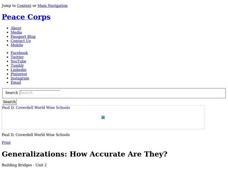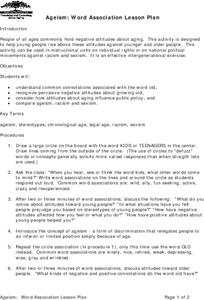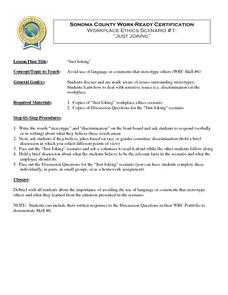Curated OER
Generalizations: How Accurate Are They?
High schoolers recognize and modify generalizations. They challenge generalizations made about people, insist on knowing the evidence that supports these, and be willing to modify their own generalizations when confronted by evidence...
Curated OER
Understanding Stereotypes
Students examine the role of stereotypes in their lives. They discuss how making unfair judgments about people affects one's view of the world. They complete a worksheet to end the lesson plan.
Anti-Defamation League
Toys and Gender
As you walk down the toy aisle, it's easy to see that toy packaging is based on gender stereotypes. Here, a lesson challenges scholars to look past the stereotypes and value a toy for what it is and the joy it brings. Through thoughtful...
San Diego County District Attorney
Just Because... Stereotypes and Gender
Help young learners identify and break down stereotypes with this these lessons and worksheets, which discuss expectations placed on others based on such factors as gender, race, and sexual orientation.
Teaching Tolerance
Parallels Between Mass Incarceration and Jim Crow
Is history repeating itself? A riveting lesson examines the parallels between mass incarceration in the U.S. and the Jim Crow Laws of the past. Academics review Jim Crow Laws and compare them to mass incarcerations of African Americans....
Teaching Tolerance
Talking About Race and Racism
Set the stage for discussion in a thought-provoking instructional activity on racism. An informative resource prepares scholars to discuss the history of race and racism with a quiz, vocabulary, and guidelines. Academics discuss topics...
Teaching Tolerance
Using Photographs to Teach Social Justice | Exposing Gender Bias
Young sociologists are asked to read two photographs, identifying how the photographer uses point of view, color, pose, light, and shadow to express a stereotype of women or to challenge those stereotypes. Partners then create their own...
Media Smarts
TV Dads: Immature and Irresponsible?
Examine gender stereotypes on television, focusing on fathers portrayed in sitcoms and advertising. Questions on a handout direct learners to consider the types of fathers they see on television and one advertisement is highlighted as...
Curated OER
Using Random Sampling to Draw Inferences
Emerging statisticians develop the ability to make inferences from sample data while also working on proportional relationships in general. Here, young learners examine samples for bias, and then use random samples to make inferences...
Center for History and New Media
Slavery and Free Negroes, 1800 to 1860
What was life like for enslaved and free black people before the American Civil War? Explore the building tension between states and the freedom of individuals with a thorough social studies lesson. Learners of all ages explore primary...
National Woman's History Museum
Getting with the Program
A seven-step lesson introduces the emergence of computer sciences and the contributions women made to the profession after World War II. Several science experiments offer pupils a hands-on learning experience that showcases parabolas,...
EngageNY
Graphing Cubic, Square Root, and Cube Root Functions
Is there a relationship between powers and roots? Here is a lesson that asks individuals to examine the graphical relationship. Pupils create a table of values and then graph a square root and quadratic equation. They repeat the process...
Curated OER
Generalizations: How Accurate Are They?
Students examine how generalizations can be hurtful and unfair. They devise ways to qualify statements so they avoid stereotyping other people and recognize and modify generalizations. They think about generalizations and stereotypes...
Curated OER
Origins of Ethnic Stereotypes
Young scholars continue their discussion of stereotypes. In groups, they brainstorm a list of ethnics living in the United States today and research their origins. They examine how the stereotypes began and why they are still prevalent...
Curated OER
Stereotypes and Cross-Cultural Understanding
Students are introduced to the topic of stereotypes. After reading an article, they complete a chart filling out the appropriate sections. They participate in a class discussion about how to eliminate as many stereotypes as they are...
Curated OER
Stereotypes and Cross-Cultural Understanding
Students continue to examine the topic of stereotypes. In groups, they role-play the roles of the "in-group" and "out group". Using the internet, they research the role of polarized stereotyping in war situations and read an article to...
Curated OER
Arab Americans: In the Aftermath of the Terrorist Attacks on the U.S.
Students examine the effects of the terrorist attacks in 2001. In this instructional activity on discrimination and the dangers of stereotyping, students will expand their understanding of stereotyping in contemporary society and compare...
Curated OER
Be Sharp and Never Flat
An outstanding activity on music awaits your young composers! They learn about patterns found in music, the different sections of an orchestra, and see the differences between musicians and a composer. Excellent streamed videos and good...
Curated OER
Identifying and Dispelling Stereotypes
Students address stereotypes. In this cultural diversity lesson plan, students define stereotypes, share examples of prejudice, research current event issues in given nations, and create posters that feature unbiased news stories.
Curated OER
Critically Examining, Analyzing and Evaluating Picture Books on Aboriginal Canada
Students combat pervasive stereotypes. In this Critical Analysis lesson plan, students examine and evaluate the stereotypes of Aboriginal groups, as depicted in a picture book. Students will use primary and secondary sources to compose...
Curated OER
Smithsonian Asian Pacific American Lesson: Immigration
Many of your class members will have heard of Executive Order 9066 and the Japanese internment camps of World War II. Some may even recognize the terms “Issei” and “Nisei,” but few will have heard of Enemy Alien Hearing Boards, of the...
Curated OER
Ageism: Word Association Lesson Plan
Students discuss the attitudes related to the word old. In groups, they identify negative stereotypes about getting older and determine how these attitudes affect public policy on the elderly. They compare and contrast the concepts of...
Curated OER
Stereotypes
Assumptions and misconceptions are two things that underlie stereotypes. Introduce youngsters to the concept of stereotyping with a role-play activity. They pretend they are employees at a restaurant who have accused a person of...
My Career Space
Just Joking
After reading a workplace ethics scenario regarding an employee who makes racially insensitive comments, your learners will discuss how language that stereotypes others is discriminatory and never "just joking."

























